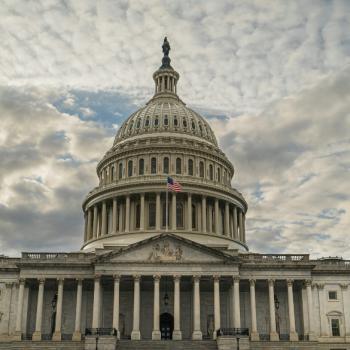Why can't we differ without damning one another?
It's an important question with real implications.
It tears at the fabric of friendships, churches, and societies. It destroys our ability to analyze problems and solve them. It isolates, stereotypes, and excludes. At its worst, our inability to differ without damning one another nurtures a world red in tooth and fang -- spelling what one sociologist describes as "The Twilight of Common Dreams."
Case in point? The demise of the friendship of two Christians who aren't on opposite sides of the political spectrum, but on opposite sides of the same side. (Read the story here.)
In last week's column I tried to suggest how important it is to learn how to be critical without being judgmental. But here I would like to challenge us to think about why we are so quick to damn one another.
One, we are afraid.
We are not always knowingly afraid, but we are afraid. Fear has us by the throat.
Even under the best of circumstances that is often the case. But these are not the best of circumstances, so we are even more afraid than usual.
Fear arises when changes are in the air, when old understandings come unstuck and no longer apply, when the balance of power is shifting, and when the familiar repertoire of solutions no longer seems to work.
Ironically, even people who are disadvantaged by the status quo act out of fear when that much change is in the air, if only because they knew what to expect from the old world.
Such are the times in which we live.
Two, we want someone to blame.
I'm a regular reader of two or three newspapers, a business journal, and a news magazine devoted to an international perspective -- and those are just the print resources that I rely upon. There are several other online services that I check with fair regularity.
If you are a news hound, you have probably noticed what I have noticed. The number of potential threats to our wellbeing seems to be growing at an exponential rate. The number of problems, the geographical variety of them, the implications they have for our collective welfare, and the complexity of each problem is off the charts.
Read the newspapers one day and the central issues seem to arise here at home. Read them tomorrow and the central issue is halfway around the world. At one moment the problems are socio-political; in the next, they are economic. Then there are the problems themselves. There was a time when we seemingly dealt with problems that involved fine-tuning the machinery of every day life. Now we seem to be revisiting basic issues. How does the economy work? Does it even work the way it used to work? Did it work in the past for the reasons we supposed?
In an environment of such growing complexity, we look for someone to blame and that leads to profound incivility that only deepens as the problems multiply. But finding someone to blame is easier than sorting through the problems.
Three, we don't want to think that hard.
Regardless of education and native intelligence, we all think deeply about some things, but we are all lazy when it comes to thinking about other things. To make matters worse, we can all argue that there is only so much time to think. As if that were not bad enough, we can all argue that what we think doesn't seem to matter in one way or another.
When those reasons for "not thinking" come together, it's a powerful cocktail and four things happen:
- We stop thinking.
- We insist on wanting what we want (without regard for how that happens or who suffers for it).
- We damn those we think stand in the way of what we want.
- And that sets an ugly cycle in motion: The deeper the complexity grows and solutions recede the more vehement we become.
If we don't find a way to think deeply and think together one of two things will happen: Our relationships and society will collapse. Or someone will opt for the inevitable, obvious, and disastrous: an unthinking flight into some kind of primitive alternative to the complexity -- a kind of collective suicide that sweeps away the problems. And that will damn us all.
Why is this a spiritual issue? Fear, the need to lay blame, and laziness take root for a reason and it is always spiritual, whether we acknowledge it or not. The three spiritual reasons I believe are back of it all are these:
One: We don't trust God.
Contrary to popular belief, trusting God doesn't free us from thinking and working for better solutions. It frees us to give ourselves to those efforts, by lending hope, meaning, and purpose to the work that we do. What I hear lurking behind the current passion for damning one another is not faith. It's fearful despair that whispers, "We are out of control. We are lost."





